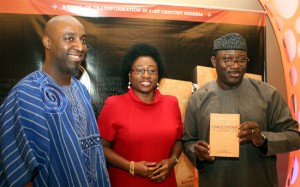
L-R: Author, Adewale Ajadi; Wife of Ekiti State Governor, Erelu Bisi Fayemi and her husband, Dr Kayode Fayemi, at the launch of the book “Omoluwabi 2.0” in Lagos... on Friday.
To expand and accelerate the good in society and possibly obliterate evil, there is need to revive the now eroded societal codes and the pre-colonial wisdom upon which the various entities that make up the Nigerian nation once stood.
This is the focus of a book, “Omoluwabi: A code of Transformation in 21st Century Nigeria” written by Adewale Ajadi and publicly presented in Lagos on Friday.
Speaking on “Character as Devotion: Towards A Transformative Ethos” at the public presentation of the book, Ekiti State Governor, Dr. Kayode Fayemi, said though modernity has reconstructed and repositioned people’s world view, there is no doubt that the fundamental character of such a worldview is based on religious culture and historical experience.
The Governor who stated that at the centre of the worldview is character, said people’s quest for modernity should be managed so as not to exchange our culture for the western culture; saying character is destiny.
“Every society has its own fundamental conception of social organization, social composition and the world. Such conception is the bedrock of how every society functions – or is expected to function – in relation to itself and the world. Also, that conception not only determines the framework and the totality of social, political and economic life, it establishes and governs the relationship between the structures of society and human agency”, he said.
While looking at the relationship between character and Nigeria’s search for transformative ethics, Fayemi identified character as culture’s thoughtful intelligence rather than blind obedience to rules; adding that character is superior to laws and formal rules in that it makes laws and formal rules easy to obey.
Governor Fayemi who described as erroneous the impression that ifa is exclusively a religious system asserted that it is not merely the foundation of a religious culture but a “conception of the universe and the relationship of human beings with the elements and the structures and dynamics of society”.
The Governor who noted that at the centre of the 256 volumes of Ifa-odu is character, also called “Iwa”, stressed that his administration in Ekiti State is restoring the values of “Omoluwabi” in the state in the process of making a difference in the lives of the people.
He added that his administration owes it a duty to the present and future generations to continue to recognize that all the virtues of good character must continue to be the legacy of the state government “as well as our individual legacies as leaders of our people”.
“We have, and we will continue to, construct a future of values and virtues based on the best ideals of public education and public service. We are committed to ensuring the creation of a new generation of young people with the foundational skills that will prepare them for competition not only nationally, but globally.
“We are conscious in Ekiti State that the foundations of our worldview is embedded in one of the most robust and most dynamic cultures in human history; one that is predicated on the understanding that character is devotion, worship, or piety (iwa l’ewa)”.
In his remarks, the Governor of the State of Osun, Ogbeni Rauf Aregbesola who was represented at the event by the Commissioner for Regional Integration and Special Duties, Mr Ajibola Basiru, said his administration has promoted the Omoluabi concept by imbibing the culture of hardwork, honesty, respect for the elderly and transparency, saying that people thrive in a society that imbibes morality.
Discussants at the book presentation blamed the nation’s plights, especially in the education sector, on both government and individuals.
The discussants who lamented the poor performance of students at the last Senior School Certificate Examination noted that parents needed to complement the efforts of teachers and government in revamping the sector.
Last modified: August 24, 2012
